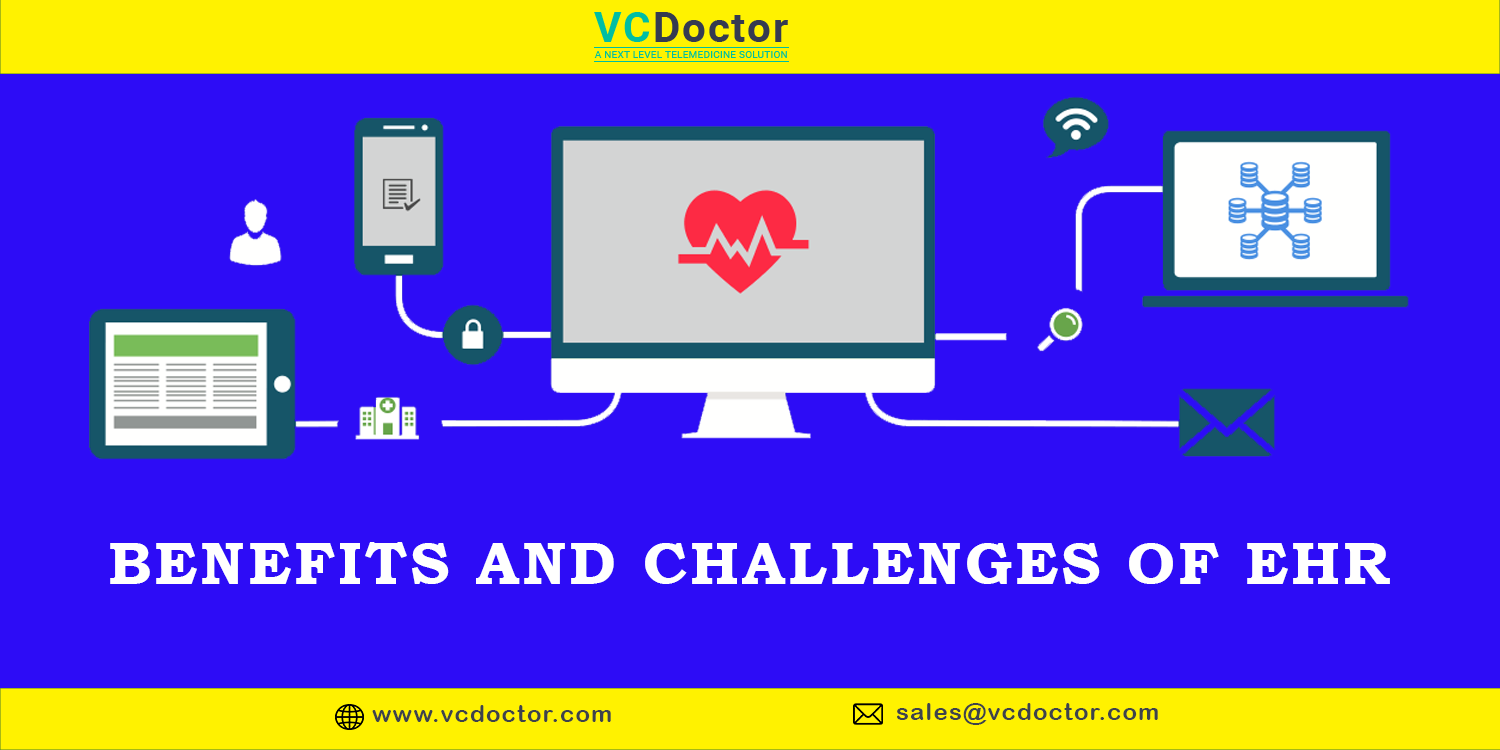Electronic Health Record Benefits and Challenges
Electronic Health Record is the opportunity to remotely share health records will assist you to provide customers with better quality and safer treatment by making meaningful improvements within the company. EHR software supports providers to efficiently coordinate patient treatment & deliver better health care. Here we’ll discuss the benefits and Challenges of EHR.
Benefits of Electronic Health Record
There are many advantages of EHR, some benefits are given below:
1. Accessibility
Since EHRs are processed electronically, various providers can access them at different times from different places. Providers are able to access the full medical history of a patient, monitor treatment decisions, and manage the course of care more effectively.
The accessibility of Electronic Health Reports can be lifesaving in a life-threatening case. By viewing the detailed medical records of patient allergies, blood type, previous medical conditions-treatment choices can be easily made.
2. Reduce Medical Error
Clearly, eliminating medical mistakes is of great value to both physicians and patients. An EHR record system avoids the issue of missing and/or misplaced patient files while also removing data errors that may result from transcription, naturally.
3. Patient Satisfaction
Patients now tend to provide a better view of tracking and managing their own personal reports and medical data. EHRs allow them the opportunity to access their information easy to see which aspects of their health history need strengthening. In addition, EHRs provide patients with:
- Access 24/7 to their documents
- Easier treatment of chronic diseases
- The reduced turnaround time to a hospital for messages
- Improved distribution of materials for schooling
4. Less Paperwork and Fewer Storage Cost
Administrative activities in the healthcare sector represent a considerable amount of time and expenses. Physicians and workers may spend a substantial part of the workday filling out and processing forms. Because they are paperless, EHRs streamline the number of repetitive tasks in hipaa guidelines for healthcare professionals.
As the amount of paperwork reduces, there is also a reduction in required storage space. Healthcare providers can see their offices becoming less cluttered with instant storage and retrieval of digital EHRs, as storage demands decline and productivity increases.
Challenges of EHR:
Some challenges of EHR are given below:
1. Electronic Health Record May Not Function as Intended
As a way of making health services more effective for patients and clinicians alike, a health center has advertised the introduction of a modern EHR system. But they encounter challenges attempting to search and find their data on the telemedicine application as patients download a smartphone app to view their health information from the system. At the health facility, physicians remember that any time they use the device, they have to re-enter their login keys, requiring time they may have devoted to patients.
Flaws and difficulties with their functionality can still be found in even the most stable and inventive EHR systems. Departments, services, and virtual clinics using EHR programs in various forms will worsen this.
2. Electronic Health Record Extensive Data Capturing
The professional workflows of doctors are hindered by comprehensive data collection. In addition to being both inefficient and time-consuming, data entry is often put off by UI/UX providers to handle their workflows. Although having things electronic allows them the freedom to stay engaged with their patients, unnecessary reminders and updates can produce doctors patients warning fatigue.
3. Training is Time-Consuming
Until introducing the EHR framework, comprehensive training on the current workflow needs to be provided to the employees. To grasp the new method, the doctors and the medical staff have to devote more time and bring more work into it. For both the employees and the administrators, it is a time-consuming operation and a headache. During the preparation process, small to mid-sized companies risk the lack of business. The workers can even, at times, find it an excessive endeavour.
4. Highly Sought-After Information in the Black Market:-
Data that is highly sensitive, such as the clinical status of the patient, is very vulnerable to data breaches and abuses.
Access to it lets pharmaceutical marketers tailor their drugs and ads, as these documents offer the most detailed description of a product’s demographics.
5. Require Frequent Updates:-
Because other healthcare providers affiliated with you can use the same electronic health record system as you, such as personal trainers and pharmacists, it is important that you keep medical records updated for any appointment or consultation. Otherwise, without your knowledge, they could search the system later to find incorrect results, leading to ineffective treatment approaches.
6. Electronic Health Record Cost:-
For some clinicians, full deployment of EHR systems will prove to be cost-intensive. As they do not have the same funding as compared to broader healthcare systems, private practitioners are more impacted. In addition to buying the EHR systems, there is a need to employ experienced personnel for the process of training and assistance. Learning to incorporate the app takes time for doctors to compromise on their timetable of patient treatment.
7. Interoperability:-
Perhaps the most critical thing about Electronic Health Records is the lack of interoperability between all different programs. To get a complete understanding of the medical history of a patient and trouble-free contact procedures improve healthcare facilities.
8. Not adopting the Electronic Health Record Best Practices of the Software Industry:-
What is more, in line with industry best practices and government legislation, developers may no longer have the option to update their EHR. It is safer to go with an established track record of several years in the market with an EHR product vendor. Read feedback closely and ask your friends what software they use (and if they recommend it or not)
What We Do for Electronic Health Record:
We designed and developed a solution for Third-Party Provider EPIC EMR Integration and also offers the free EPIC EMR Demo.
With this integration, providers can offer their Testing services to EMR where they can select appropriate lab tests and make orders based on patient conditions recorded in EMR.





Well-defined the benefits and challenges of EHR. I liked this post, thanks for sharing.
EHR is the most important part of telehealth/telemedicine. This post has fantastic information that helps us to understand the EHR benefits and challenges. Thanks for sharing.